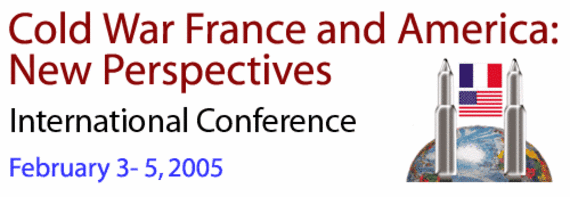
|
| In its most familiar guise, the Cold War designates the global rivalry between Eastern and Western blocs between the end of the Second World War and 1989. At the same time, it may be understood as a metaphor for the political, cultural and artistic tensions that emerged between France and the United States during the same period. While these two nations were in the process of formulating very different positions with regard to the Soviet Union in particular and Marxism in general, they were also experiencing a radical redistribution of the symbols of military, political, economic and cultural hegemony. American support for Western Europe's economic reconstruction was administered through the Marshall Plan headquarters in Paris, close to which were the European headquarters for NATO until de Gaulle forced the U.S.-led military alliance off French soil in 1967. New York replaced Paris as the center for the visual arts, and American literature and popular music enjoyed ever-increasing popularity in France, while the experimental nature of the nouveau roman had the unintended side-effect of seriously weakening the market for French literature abroad. One might have argued that France was the past, while the United States was the present and the future. However, at the same time, French intellectuals and politicians, ranging across the political spectrum from Jean-Paul Sartre to Charles de Gaulle, were among the very few who were consistently challenging the American tendency to dictate policies for "Western democracies," justify racial segregation, or wage wars against third world countries in the name of stopping the spread of Communism. The clashes between the two nations were at times acrimonious, but never without irony. On the level of popular culture, while the golden arches were reshaping France's urban landscapes, traditional French cooking, championed by Julia Child and company, was becoming de rigueur in the households of American intellectuals. Also, although French intellectuals might often decry American political obtuseness, abroad their more arcane theories were receiving a very friendly welcome on American campuses. Whatever else one might wish to say about France and the United States during the Cold War years, it seems obvious that the two peoples never lost interest in each other.
Since the Iraq war of 2003, relations between France and the U.S. have entered another turbulent phase, making this a timely moment in which to re-assess the Cold War period in the light of recent and current research. How far were post-war relations between France and the U.S. a product of circumstances peculiar to the Cold War? To what extent were they rooted in a more deep-seated clash between national cultures and polities? What are the enduring legacies of French and American thinkers, artists and politicians active during the Cold War period? Do central threads of that period now appear as so many dead ends? How far can the transnational ideological battles at the heart of the Cold War help illuminate the state of Franco-American relations amid today's global "war on terrorism"? These issues will be explored in an international conference hosted by Florida State University's Winthrop-King Institute for Contemporary French and Francophone Studies in Spring 2005. Submissions are invited in any discipline relevant to the subject. Proposals may come from individuals or from a group wishing to make a panel presentation. |
|
| Possible topics include | |
|
|
| These are indicative topics, and the list is not restrictive. Standard panels will normally consist of three papers. Proposals are welcomed for individual papers, whole panels or non-standard types of session on any topic relevant to the overall conference theme. Presentations will be selected for inclusion in the conference program on the basis of merit. | |
| All submissions must contain the following information for all proposed speakers: | |
|
|
| Proposers of panels and other sessions must provide the above information for each paper, together with their own contact details and a brief description/summary (250-500 words) of the overall rationale for the proposed panel or session.
Deadline for submissions: July 1, 2004 Proposals and enquiries should be addressed to: Dr Alec G Hargreaves The preferred method of communication is e-mail. Information updates will be posted regularly on the conference web-site: So that you can be alerted to updates, please be sure to include your e-mail address when contacting the conference organizers. Organizing Committee: Dr William J. Cloonan (Department of Modern Languages & Linguistics), Dr Michael Creswell (Department of History), Dr Alec G. Hargreaves (Winthrop-King Institute for Contemporary French and Francophone Studies), Dr Adam Jolles (Department of Art History) |
For more information contact:
Department of Modern Languages and Linguistics
Florida State University
Tallahassee, Florida 32306-1540
Telephone 850.644.7636
Fax 850.644.9917
E-mail icffs@mailer.fsu.edu
Website www.winthropking.fsu.edu
